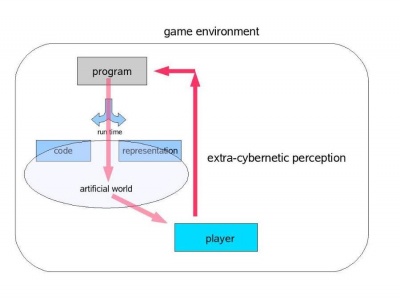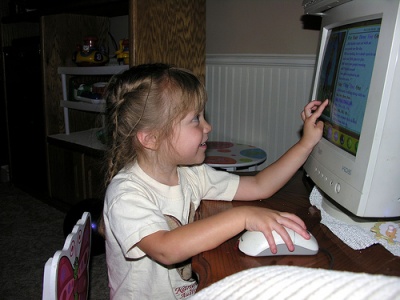Interaktivität, theoretische Ansätze (PSI)
<root> <div class='right_side_navigation' style='width:156px;position:fixed;bottom:50px;background-color:#efefef;border-color:#bbbbbb;border-width:1pt;border-style:solid;padding:1px 2px;font-size:8pt;text-align:center;filter:alpha(opacity=90);-moz-opacity: 0.9;opacity: 0.9;'> Navigation (PSI)<br> Hauptseite (alt)<br> Hauptseite (Endspurt)<br> recent changes<br> Alle Seiten
Development<br> Endspurt<br> Dev-Talk<br> ChangeLog<br> Repository<br> Global Mindset V4<br /> Szenariosammlung<br /> Projekt-Präsentation
</div><ignore><includeonly></ignore><ignore></includeonly></ignore></root>
Clips zu Plato || Sky Patrons || Freiraum: Interaktive Textumgebung
Nick Montfort: Toward a Theory of Interactive Fiction
Command Lines, Dissertation Jeremy Douglass
Interactive Fiction And Reader-Response Criticism, Paul O'Brian
mein Ideenbeitrag zur Realisierung des in diesem SE geplanten Programms - I. Tomov
Michel Chaouli: How Interactive Can Fiction Be?
Exzerpte:
"Whether the move toward equality in social relations is hastened by liberating the signifier can be debated, yet the prior step in the argument— that the lopsidedness of author and reader represents a tyranny to be abolished for the good of art—strikes me as erroneous. The opposite seems to me to hold: “interactivity”—high communicativity of any sort—interferes with the unfolding of literature, particularly with writing that means to lead us into fictional worlds. Even the technically modest oral narrative demands a highly artificial communicative situation: someone speaks, and all others remain silent. Driven by a moral impetus that finds hierarchies of all kind anathema, many critics (particularly in the United States, where a robust suspicion of hierarchy is woven into the nation’s ideological DNA) have made it their charge to topple them wherever they might encounter them. In the process, they tend to ignore the fact that in order for art to occur, communication must be distributed unevenly: some narrate, write, dance, or sing, while others listen, read, or watch. The productive, and satisfying, side of this asymmetry reveals itself in the eagerness with which recipients willingly cede communication for the sake of the pleasures the narrative experience affords.
Not only aesthetic pleasure but critical engagement, too, paradoxically depends on shutting down (or at least severely diminishing) the return channel of communication, for only when participants are released from the labor of constructing a text on a material or topological level (becoming “passive recipients” in that respect) can they become hermeneutically active and think their own thoughts about what they are reading, seeing, or hearing. Friedrich Schlegel’s ideal reader, the template of all critical readers to come, can only be imagined as 'not resting and dead, but alive and counteracting,” when on the level of inscriptions he or she does rest and refrain from acting.'"
...
"When in my role as the reader-user I am obliged to manipulate the text by choosing a link, I violate not the distinction of fiction and reality but rather the far more crucial copy of this distinction within fiction itself. For through my choice I intervene in the fictional world, and I do so urged on by my real appetites and anxieties. Instead of extending the range of fiction to myself, my self advances into the fiction. In contrast with ritualized acts of reception (such as turning a page or circling a sculpture), when reading hyperfiction I change the course of the narrative according to my own motivations, which may remain opaque to me. The moment a part of reality appears in its stark nonfictional form within fiction, the latent reference that fiction maintains to reality is interrupted, and the fiction itself begins to come apart."
...
"I admit that the question with which I began—the question of whether forms of fiction making might be able to make use of the communicative features of the networked computer—remains open, but these reflections may at least have narrowed the field over which it can range. We can say this: there are two main shifts to which fiction (literary or otherwise) must adjust when it is communicated in a medium in which the recipient helps to assemble the system of inscriptions in topologically significant ways. First, it needs to recognize that the role of the reader familiar to us from print changes in the degree to which the links between textual elements remain semantically underdetermined. Second, fiction somehow needs to manage the fact that the user’s navigational decisions can be driven by motives wholly divorced from the fictional world, provoking a crisis of fictionality. The fictionalization of reception is one way of addressing both shifts, for a fictionalized “interaction” would be severely limited by the boundaries of the fiction, thus rendering the fictional world a larger, more complex, and more interesting space to inhabit.
If the examples for the sort of fictionalization of reception I have in mind (MUDs and MOOs, various web-based writing games) are any indication of things to come, then the forms of fiction making we can expect to find in the medium of the networked computer will have little in common with traditional notions of literature. The reason is quite simple: such games do not produce primarily readers but writers, and these writers do not write to be authors; what they put down is not meant to amuse or instruct other readers, rewarding them as readers, but meant rather to provoke them into becoming writers themselves (by contributing to the writing game, for instance)."
zurück zu Platos Staat interaktiv (Projekt-Seminar Hrachovec 2008/09)


